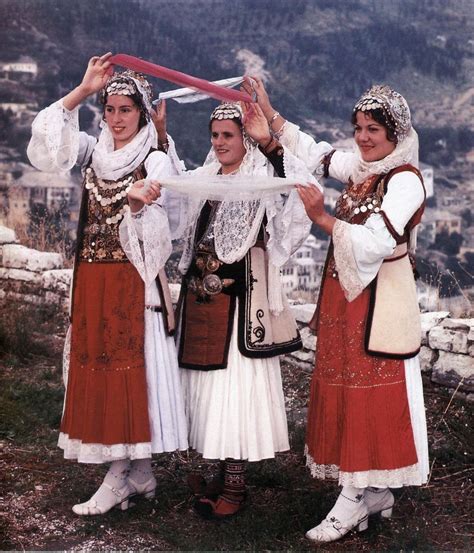Albania is a land rich in history, culture, and folklore, with a wealth of traditional tales, customs, and rituals that have been passed down through generations. In this blog post, we will delve into the fascinating world of Albanian folklore and traditions, exploring their origins, enchanting folk tales, sacred customs and rituals, vibrant festivals, and the ongoing efforts to preserve this important part of Albanian heritage. From the mystical origins of folklore to the modern-day celebrations of traditional festivals, Albania offers a unique and enchanting experience for those seeking to explore its cultural wonders. Join us on this journey of discovery as we uncover the deep-rooted traditions and captivating folklore that make Albania a truly special and magical place.
Origins of Albanian Folklore and Traditions
Albanian folklore and traditions have a rich and diverse history that dates back thousands of years, with influences from various civilizations and cultures. The origins of Albanian folklore can be traced to the ancient Illyrians, the earliest known inhabitants of the region. These ancient people had a strong oral tradition, passing down stories, myths, and legends through generations. This oral tradition laid the foundation for the development of Albanian folklore and traditions.
As the Illyrian civilization interacted with and was influenced by the Greeks, Romans, and other neighboring societies, Albanian folklore and traditions began to incorporate elements from these cultures. Over time, these influences merged with the existing Illyrian folklore, resulting in a unique and diverse tapestry of stories, customs, and beliefs.
The origins of Albanian folklore and traditions also reflect the country’s complex history and the various rulers and empires that have governed the region. Each successive wave of conquerors, from the Byzantines to the Ottomans, left their mark on Albanian folklore and traditions, adding new layers of stories, rituals, and customs to the existing tapestry.
Despite the influences from other cultures, Albanian folklore and traditions have managed to preserve their distinct identity and character. This resilience is a testament to the strong sense of cultural pride and heritage among the Albanian people, who have safeguarded their folklore and traditions through centuries of tumultuous history.
The Enchanting World of Albanian Folk Tales
Albanian Folk Tales have been passed down through generations, captivating audiences with their magical and enchanting stories. These tales are a rich part of the country’s cultural heritage, filled with mythical creatures, heroic quests, and moral lessons that have been cherished for centuries. The diversity of Albanian folk tales reflects the country’s unique history and its rich blend of influences from various civilizations.
From stories of brave heroes and virtuous maidens to magical beasts and mysterious encounters, Albanian folk tales transport listeners to a world of wonder and imagination. The tales are often set against the backdrop of the country’s breathtaking natural landscapes, adding an extra layer of charm and allure to the narratives.
One of the most famous Albanian folktales is the Kosovar Legends, which showcases the heroism and resilience of the Albanian people against the backdrop of the country’s tumultuous history. These tales often serve as a source of national pride and identity, connecting people to their roots and instilling a sense of unity and belonging.
Albanian folk tales continue to be celebrated and preserved through various mediums, including literature, theater, and even modern adaptations in film and television. The enduring appeal of these tales is a testament to their timeless relevance and the enduring power of storytelling in shaping cultural identity.
Sacred Traditions: Albanian Folk Customs and Rituals
The Albanian culture is rich in traditions and customs that have been passed down through generations. These sacred traditions play a crucial role in the daily lives of the Albanian people, shaping their beliefs, values, and sense of community.
One of the most significant aspects of Albanian folklore and traditions is the emphasis on family and community. The customs and rituals associated with birth, marriage, and death are deeply rooted in Albanian culture, reflecting the importance of family ties and community unity.
Another integral part of Albanian folk customs and rituals is the celebration of religious holidays and festivals. These sacred traditions are deeply rooted in Albanian culture, blending Christian and pagan beliefs and practices to create a unique and enchanting celebratory experience.
Despite the modernization and globalization that have influenced Albanian society, efforts to preserve and celebrate traditional folk customs and rituals
Celebrating Albanian Festivals: A Blend of Tradition and Modernity
Albanian festivals are a reflection of the rich cultural heritage and diverse traditions of the country. They serve as a blending ground of tradition and modernity, where age-old customs are infused with contemporary influences.
One of the most prominent Albanian festivals is the Summer Day, which is celebrated on March 14th. This festival marks the end of winter and the beginning of spring, and it is a time when people gather to enjoy traditional music, dance, and food. While the roots of this festival lie in ancient pagan rituals, it has evolved over the years to incorporate modern elements, such as outdoor concerts and art exhibitions.
Another significant Albanian festival is the Independence Day, observed on November 28th. This day commemorates the country’s declaration of independence from the Ottoman Empire in 1912. It is a time when the entire nation comes together to celebrate their freedom and honor the heroes of the past. The festival features parades, flag-raising ceremonies, and fireworks displays, highlighting the fusion of traditional and modern expressions of national pride.
Albanian festivals serve as a testament to the seamless integration of old and new, where time-honored rituals and customs continue to thrive alongside contemporary innovations. They are a reminder of the enduring spirit of the Albanian people and their commitment to preserving their cultural identity in the face of modernity.
Preserving Albanian Folklore: Efforts and Challenges
Preserving Albanian folklore is a vital undertaking that requires an understanding of the challenges and the efforts involved in this noble cause. The rich folklore of Albania is steeped in history and tradition, with a diverse range of customs, traditions, and rituals that have been passed down through generations. However, in today’s rapidly changing world, preserving this cultural heritage presents its own set of challenges.
One of the key challenges in preserving Albanian folklore is the threat of globalization and modernization, which often leads to the erosion of traditional customs and practices. As young generations become more influenced by global trends and modern lifestyles, there is a risk of losing the unique cultural identity and heritage that is encapsulated in Albanian folklore.
Efforts to preserve Albanian folklore are being made through various initiatives, such as cultural festivals, educational programs, and the documentation of folk tales and traditions. These efforts aim to raise awareness about the importance of preserving Albanian folklore and to instill a sense of pride and appreciation for the country’s rich cultural heritage.
However, despite these efforts, there are still significant challenges to overcome, including the lack of resources and funding, as well as the need for greater support and recognition from the government and the broader society. It is essential for the preservation of Albanian folklore to be prioritized and given the necessary support and attention it deserves in order to ensure that future generations can continue to enjoy and celebrate the enchanting world of Albanian folklore.
Frequently Asked Questions
What are the origins of Albanian folklore and traditions?
The origins of Albanian folklore and traditions can be traced back to ancient times, influenced by various cultures and historical events that have shaped the unique customs and beliefs of the Albanian people.
What is the enchanting world of Albanian folk tales?
The enchanting world of Albanian folk tales is filled with mythical creatures, heroic figures, and moral lessons that have been passed down through generations, reflecting the rich storytelling tradition of the Albanian culture.
What are some sacred traditions in Albanian folklore?
Albanian folklore is rich in sacred traditions, including customs and rituals related to birth, marriage, and death, as well as beliefs in supernatural beings and spiritual practices that are deeply rooted in the traditional Albanian way of life.
How do Albanians celebrate their festivals?
Albanians celebrate their festivals with a blend of tradition and modernity, combining ancient rituals and customs with contemporary activities, music, and food, creating a vibrant and festive atmosphere that reflects the dynamic nature of Albanian culture.
What are the efforts and challenges in preserving Albanian folklore?
Efforts to preserve Albanian folklore face challenges such as modernization, urbanization, and globalization, which threaten the authenticity and continuity of traditional customs and beliefs, prompting initiatives to document, safeguard, and promote the rich heritage of Albanian folklore.






